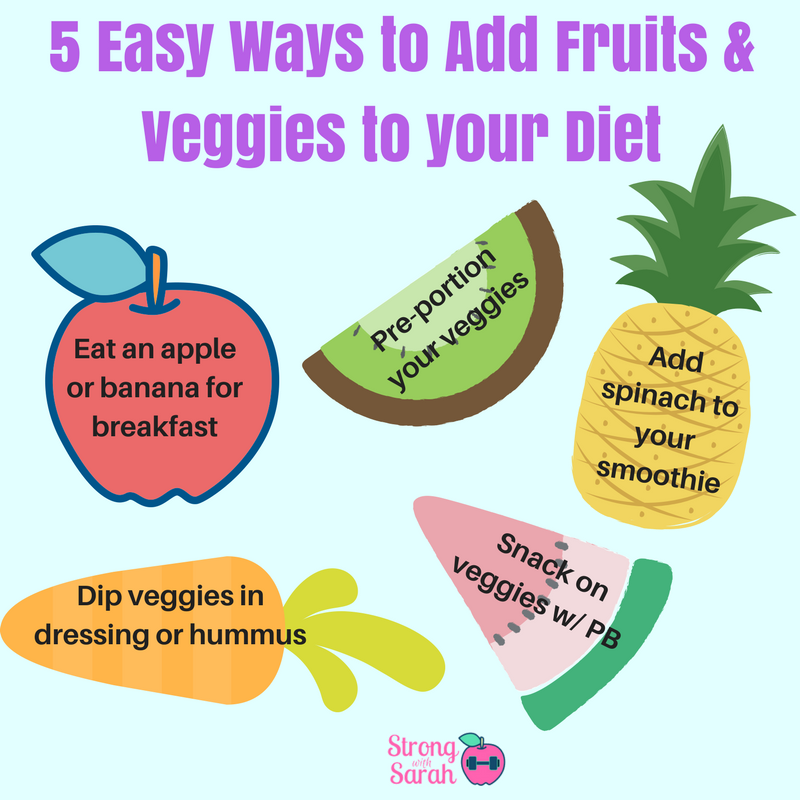Civic Issues
Caloric intake and nutritional intake
Today’s post is going to be different from the usual food group post. Today I will be talking about caloric intake and nutritional intake. What I mean by this is how many calories should you eat in a day, along with how much fat, protein, carbs, sugar, and fiber you should eat in a day to have a healthy lifestyle and feel good.
To start, I will talk about how many calories you should eat in a day. If you look it up online, it says that the average male should eat 2000-3000 calories in a day while the average adult woman should eat 1600-2400 calories. I personally do not like that there is a label on how many calories you should eat in a day, because everyone’s body is different and everyone has different goals. For example, if you are into the gym you have probably heard the terms “cutting” and “bulking”(cutting means you are trying to lose fat and contain muscle so you look lean, bulking means gaining any weight you can so that your muscles grow faster and larger) and when you are cutting you want to be in a caloric deficit(burning more calories than you eat) in order to lose fat. This number may not fall in the “healthy range” that is given to us, but that does not mean they are unhealthy, it simply just means that they are trying to achieve their goals. The same goes for someone bulking, or an athlete that is working really hard in the sport, when bulking you want to eat a ton of calories so that you can gain weight, so you could be above the “healthy range.” If you are an athlete who is in the middle of a tough season, it will take you way more calories to fuel your body, but it doesn’t mean you are unhealthy. I know I haven’t answered the question: How many calories should I eat a day? I will say that it depends. It is a very vague answer and doesn’t tell much, but it really depends on what your goal is. If your goal is simply to just stay the same weight then I would suggest around 2,000 calories, as long as you get all the proper nutrients in you will be just fine. If you are serious about it and want to know more, myfitnesspal is an app that counts your calories, if you put in your height, weight, sex, and weight goal it will give you an estimate for how many calories you should eat in a day.
:max_bytes(150000):strip_icc():format(webp)/What-Are-Calories-and-How-Many-Do-You-Need-2c7a044cb4d942d199f270239b02e9da.jpg)
I will list the percentages of nutrients that you should be eating:
- Fat- 25-35%, which comes to around 80g if you eat 2000 calories a day, but the percentage is more important because you will eat different amounts of calories
- Protein- 10-35%, Between 50-175g in a 2000 calorie diet. If you are lifting a lot and want to put on muscle the general rule that I follow is 1g of protein for every pound you weigh
- Carbs- 45-65%, This will be the majority of your calories, everything is carbs, from fruit to veggies to rice to bread. Carbs are turned into glucose which is the energy source in the body.
- Sugar- less than 10%, this is something that Americans struggle with, because one soda is way more sugar than you should have in your life. It is best to limit your sugar by cutting out soda and don’t eat a dessert at dinner. (Fruit sugar is completely different, eat as much fruit as possible)(DIET SODA DOES NOT MEAN BETTER FOR YOU, THEY ARE FILLED WITH CHEMICALS THAT ARE WORSE THAN SUGAR DRINKS)
- Fiber- The rule of thumb is 14g per 1000 calories of food, this will help you digest food and decrease risk of diabetes and heart disease, very important.
More Nutrition
Because I talked about fruit in the last post, I think it only makes sense that I talk about the benefits of vegetables now. I will once again be going over the benefits of vegetables, how many veggies you should eat in a day, and how you can easily add vegetables to your daily diet.
So, the benefits of vegetables are pretty much endless, and eating different vegetables will change the benefits that you will see. So I will be going over the overall benefits, and then going over specific benefits. The overall benefits of eating vegetables are as follows:
- They are rich in Antioxidants and Phytochemicals that reduce chronic inflammation
- It helps reduce high blood pressure- They include potassium that helps cancel out sodium
- All vegetables include Fiber, which is good for gut and heart health
- A handful of vegetables have lutein and Zeaxanthin, which are both carotenoids that help improve your eye health, which is very helpful in today’s screen age
- Different vegetables also help your skin health, which I will talk about more when I talk about the specific benefits of them.
- Veggies include many cancer-fighting nutrients that can drastically reduce your risk of certain cancers
- Eating vegetables can improve your brain function, while also reducing your risk of Alzheimer’s and dementia
- They also include a lot of vitamin C, which improves your immune system
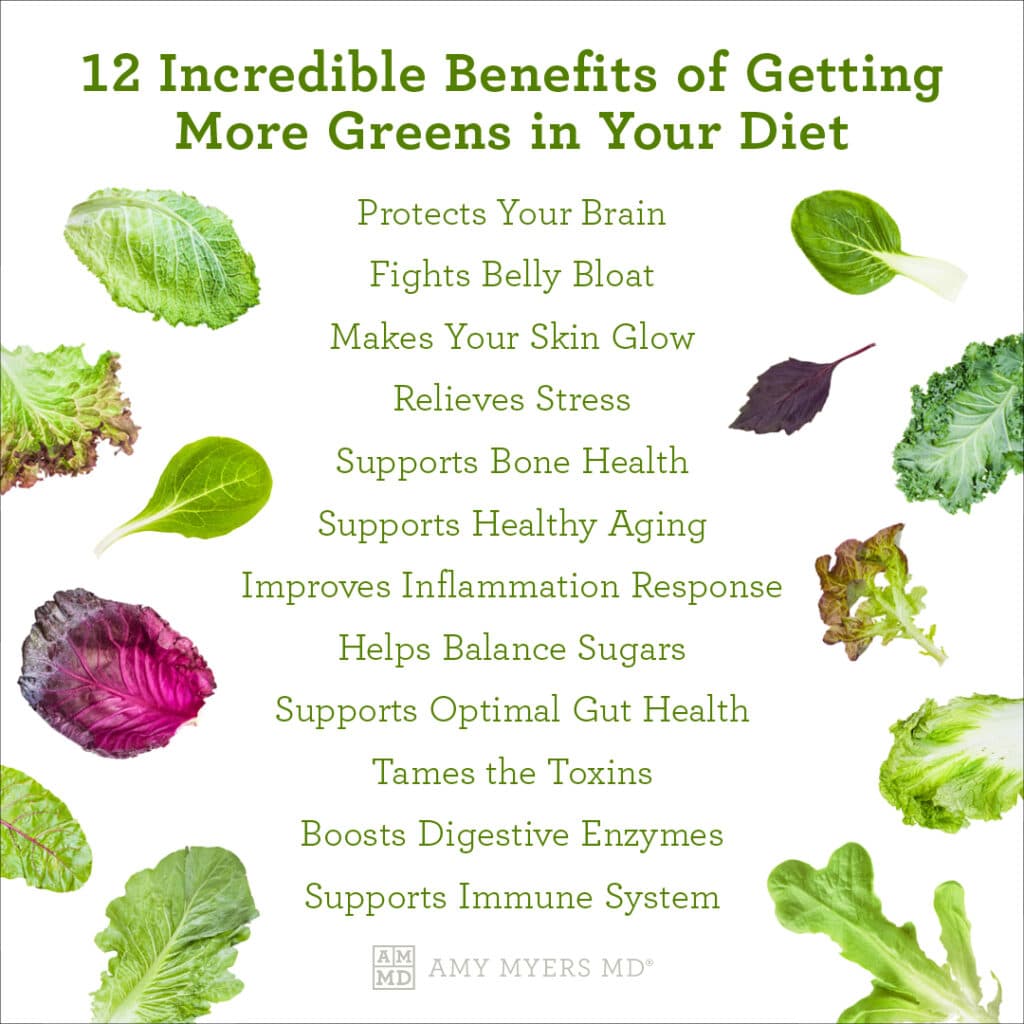
These are not all of the benefits, but these are some of the biggest ones. I will now talk about the specific benefits that certain vegetables give you.
- Spinach- A full cup has the daily reconmmended amount of Vitamin K, Vitamin A, Vitamin C, Magnesium, Folate, Iron, calcium, and antioxidants
- Broccoli- The most popular vegetable for a reason, it has a ton of vitamin K and vitamin C.
- Beets- Contains a lot of potassium and Folate. Study showed that drinking beet juice significantly lowered blood pressure.
- Onions- Vitamins C, B6, and manganese make onions very good to eat. But they also include sulfer, which can help prevent cancer.
For a healthy diet, you should try to get 2-3 cups of vegetables in a day, and it is best if you switch them around a little bit, so you get benefits from all of them.

Now, most importantly, how am I supposed to get all of these in a day, especially at the dining hall. For me personally, I will get a breakfast with either a lot of fruit at the dining hall, or get an açaí bowl, both are good options to get fruit in for the day. My snacks in my room consist of fruit yogurt, apples, and apple sauce. Also. every time I go to the dining hall I take a piece of fruit to go, so I can snack on bananas or oranges later. For lunch and dinner, I will get a cup of whatever vegetable they have, even if I am not a fan of it, I force myself to eat it because the benefits are so good. If you are making your own meals, you can look online for healthy meals with vegetables and find a million different results, from beginner to difficult.
Nutrition
In today’s passion blog, I will be going back to talking about nutrition and foods. In today’s blog, the main topic will be a personal favorite of mine, fruits. I will be going over the Benefits of fruit, how much you should eat, and any cons of eating fruit.
First, the benefits of fruit. There are so many different benefits, that I would be able to write a book about them, so I will try to keep this short and readable. Fruits have dietary fiber, which is a vital nutrient our bodies need. It helps reduce blood cholesterol levels and may reduce the risk of heart disease. It also includes vitamin C, which is a nutrient responsible for the growth and repair of body tissue. This is very important for your body, and if you don’t have enough you will be inflamed and fatigued. On top of that, vitamin C also heals cuts and wounds, keeps teeth and gums healthy, and helps your body absorb iron. These are all important to the body, you don’t want wounds to take a while to heal, or your gums to be inflamed. Next, fruit is low in sodium, fat, cholesterol, and calories. There is really no reason to not eat fruit because it has all of these benefits with no downside, it is almost the perfect food. Lastly, some fruit is very high in potassium, which is helpful for maintaining a healthy blood pressure. Bananas for example have a lot of potassium, which also makes them helpful in preventing cramps, that is something I became very familiar with while playing football. As you can see, fruit is a very good fruit to put into your daily diet, but if you still have doubts I will leave a link to a website giving more details. I will now move into how much fruit you should eat. Click here
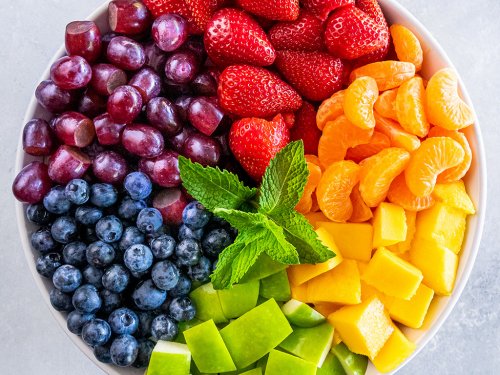
How much fruit should you eat? This section will be much shorter because I have less to explain. In general you should be eating at least a cup of fruit every day, which is 1 cup of fruit, 1/2 cup of dried fruit, and 1 cup of 100% fruit juice(has to be 100% because it will have added sugars and other things if not). The amount that you should eat also depends of age, sex, height, weight, and physical activity, but if you aim for at least a cup a day you will be good.
Onto my next section, the cons of fruit. There is no reason to not eat fruit in your diet, because no cons are present. When you eat a fruitarian diet however, you will experience nutrient deficiencies, because fruit doesn’t have all the nutrients you need, such as protein. But for eating a normal amount of fruit in a balanced diet, there is nothing to worry about.
Another link if you want to learn more
EAT YOUR FRUIT!!
Supplements part 3: POST 4
So far we have talked about a lot of different things, from nutrition to supplements. Today will be the last supplement that I talk about, and after this, I will be focusing on nutrition. Before we dive into this blog, I want to give the backstory of why I am talking about it. I personally do not take this supplement, but I know many people who do and they love it, so I will not be including my own experience like I usually do. The supplement that I am talking about is Ashwaghanda
Supplements part 2: POST 3
In my second post about supplements, I will be talking about another one that I recently started taking. This second supplement may sound gross, and your parents or grandparents might’ve taken this. The supplement is fish oil. Fish Oil is one of the most popular supplements on the market today, as it is taken by many people, young and old. The first time I bought fish oil, I won’t even lie I went to Target with my friend, and my problem is that every time I go to Target I have to buy something. I didn’t go in to buy fish oil, but when I walked out I had the supplement in my bag. I don’t know why I bought it, I had heard it was good for you and I think looked up on Google if Fish oil is a good supplement. That Google search said that it was one of the best supplements to take, and that was all I had to hear.

The article that I read said that NatureMade Fish Oil was the best and most natural one, so that is the one that I ended up getting. It is very cheap if you get the basic version, around $8.
Now to get into the positives of Fish Oil. When you look it up it says that Fish Oil helps with the proper development of eyes, brain, and reproductive cells. It also helps with heart and lung health. Read more about Fish Oil here.
What I personally have noticed from taking Fish Oil is that I have been able to focus much more in class, and my body has overall felt better(I was sick when I started taking it and a couple days later I was fine. Not sure if it was the Fish Oil or if I just naturally healed). Most of the benefits that your body will receive are not really noticeable. Saying that, I have definitely seen an increase in brain function, which is still really good.
The Negatives that they said come from Fish Oil are burps, bad breath, and a bad taste. I have yet to experience any of these negatives, so I am not complaining about it.
Overall, I would 100% recommend taking Fish Oil, as there are very little downsides and the only thing that you will experience is positive results or nothing. Another article about Fish Oil
Supplements and vitamins: POST 2
In my next post, I will be talking about a supplement that I recommend. I have recently started taking this supplement and have seen a variety of benefits from it. The supplement is creatine, which is a highly studied supplement for athletes and bodybuilders. I am going to be breaking down everything that you need to know about the supplement, and if you should take it. I will also be talking about my personal experience with the supplement.

Creatine, what is it? What does it do? Is it safe? What are the pros? What are the cons? What have you experienced? These are all common questions I get asked when I tell people that I take creatine, and I will be answering all of those questions in this segment. Creatine is a natural amino acid that is found in a lot of meat, fish, and milk. Your body also creates creatine in the liver, Kidney, and Pancreas. However, most people don’t get enough creatine this natural way, so taking a supplement can be very beneficial. It is an amino acid that is a building block of protein (protein helps muscles grow) that can help muscles grow faster, bigger, and recover faster. While helping grow muscle, it also gives your muscles more energy, and even goes to the heart and brain to positively affect them. Creatine is actually one of the most researched supplements in the world, and there have been very few flaws found; these include dehydration, upset stomach, and cramps. Because creatine takes a lot of water, people often forget that they have to drink a lot more water, which leads to cramping and dehydration. Overall, none of the cons are threatening, and the pros definitely outweigh the cons of this supplement. Here is an article that really breaks down everything about creatine. Creatine 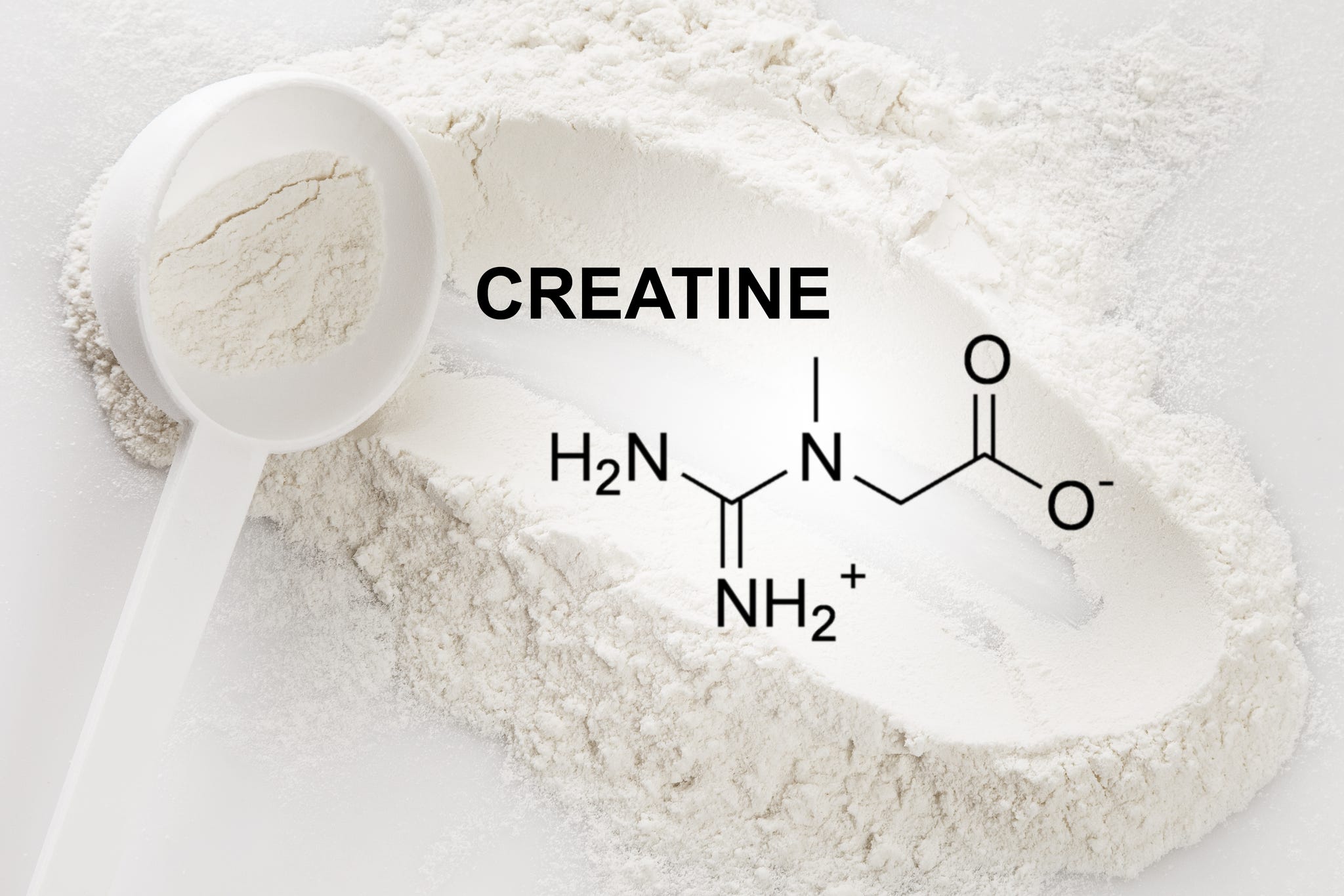
My personal experience with the supplement has been a 10/10. Since taking creatine, I have gained almost 25 pounds of muscle, and I haven’t experienced any of the flaws. I used to be scared to take it because of myths that I had heard, but when I did my own research I realized that those were all fake. Some of the myths that you may hear are: Creatine is bad for your kidneys, it will make you fat, it is all water weight, and it’s too much effort. I heard all of these before, and after doing research it is very clear that those are all fake, and no scientific studies show any of these. If you would like to read into this topic more I found a good website that goes over the pros and cons.http://Creatine Pros and Cons
I recommend looking into the topic more and doing your own research before you take creatine, but if you do take it, it doesn’t disappoint.
First Passion Blog
Hello, my name is Brad Gelly, I am a freshman at Penn State. I am going to be writing my blog on nutrition. I am writing about this topic because recently I have become very passionate about it, and I want to share what I have learned with others.
When I arrived at Penn State for the summer session, I reached a roadblock, and it seemed like my body was at a peak for growth. Upon further research, I realized that lifting is only half of the battle in building muscle. Once at the Summer session, I was still eating the same amount of food, but the food I was eating was all beneficial to me. In this blog, I will share the three foods that I found to help the most.
In this first post, I will be going over some of the foods that have the most benefit to you, and why. First, if you are trying to build muscle, one of the best things you can eat is chicken. This is because a chicken breast has 53.4g of protein, 284 calories, and 6.2 grams of fat. This means that a chicken breast is a very lean protein, so your body will get a ton of protein with very little downside(Fat). I noticed a lot of muscle growth once I started eating chicken a couple of days a week. Protein is not the only benefit of eating chicken. According to the National Chicken Council, chicken also includes vitamins and minerals involved in brain function, promotes heart health, strengthens bones, and aids in weight loss. Chicken is a very healthy food that you should include in your diet, no matter what your goal is. However, there are a lot of ways to eat chicken in today’s world that take the health out of chicken, so you have to be careful as to what you eat. The healthy chicken that will give you all of the benefits is grilled, roasted, steamed, or any other way that doesn’t add any extra fat. The chicken to stay away from is fried chicken, it will add about 200 calories and 16 grams of fat. You can’t have a healthy diet without balance, so don’t eat chicken more than 4 days a week, and definitely include the next thing.
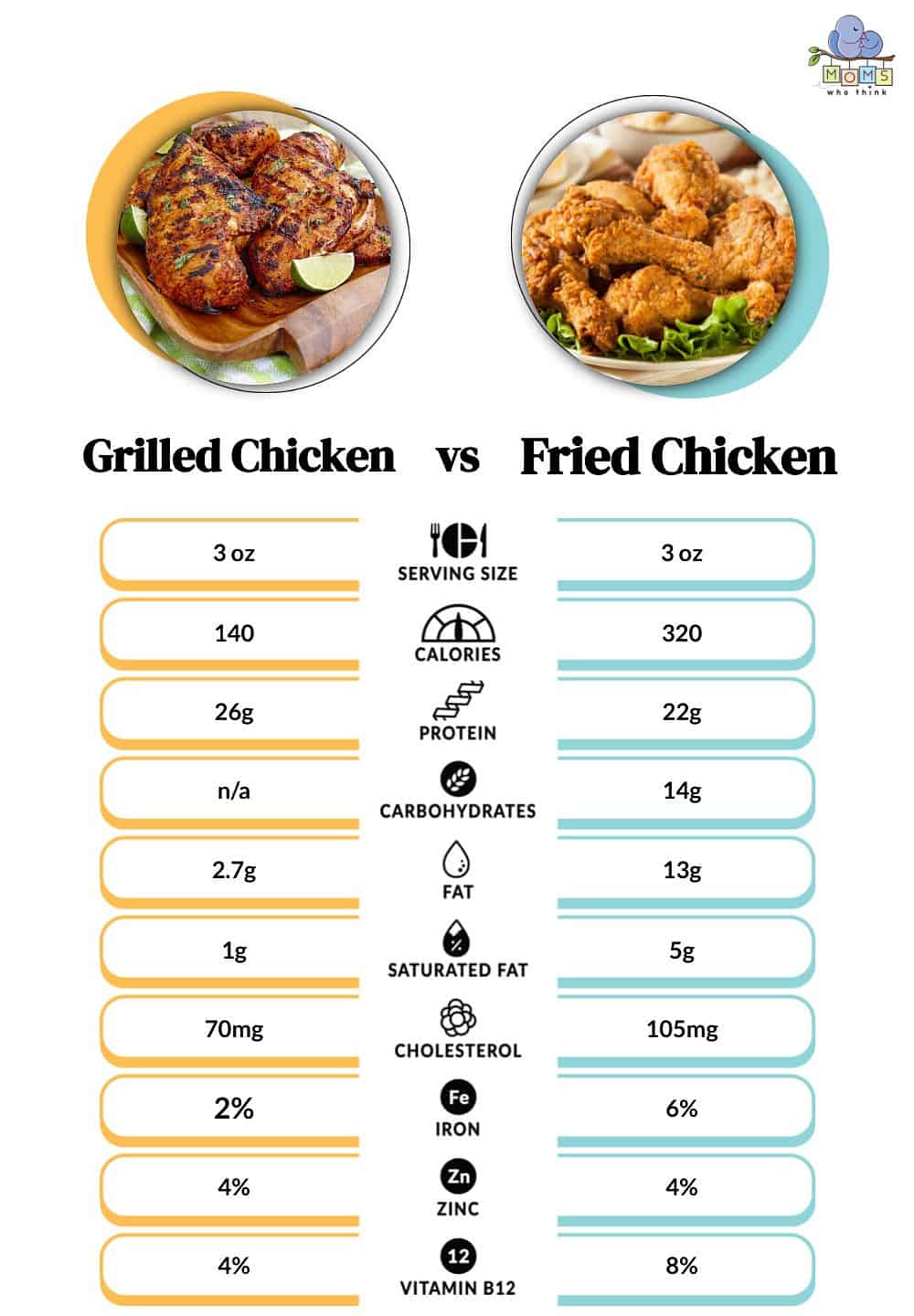
Grilled Chicken vs. Fried chicken, the health differences are very clear. Image Link
Secondly, I will be going over two different food groups, fruits and vegetables. I know that you may not like hearing about these foods because they sound like what your parents used to say when you were a little kid. However, your parents were right when they said that because these two foods are superfoods. Harvard School of Public Health did a study on fruits and veggies and their benefits. In the article, they found that “A diet rich in vegetables and fruits can lower blood pressure, reduce the risk of heart disease and stroke, prevent some types of cancer, lower risk of eye and digestive problems, and have a positive effect upon blood sugar, which can help keep appetite in check.” Once I started vegetables or fruit daily, I really noticed a difference in how my body felt. I had much more energy, I was able to focus better in class, and my workouts felt much more effective. I will cover the specific fruits and vegetables in a different blog, but you can eat any of them and receive the benefits.

It is good to eat a variety of different fruits and veggies, and even berry if you can fill out the whole rainbow. Image Link
I tried to incorporate what we learned from “How to Write With Flair” by adding in some new verbs, and getting rid of some of the “boring verbs.” What I found was that it is much harder than I thought it would be, I have been writing the same way for most of my life and suddenly changing something is very difficult. I know if I can continue to make small improvements like this though, my writing will be on a whole new level.
